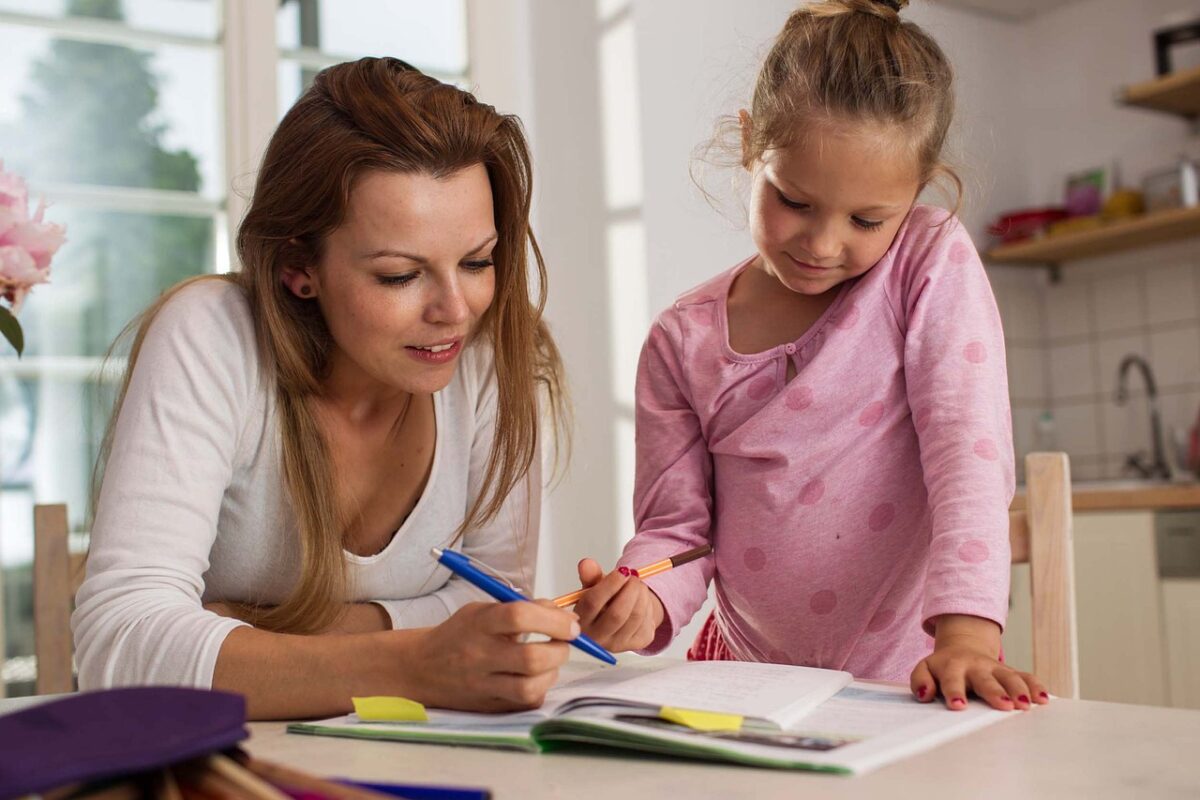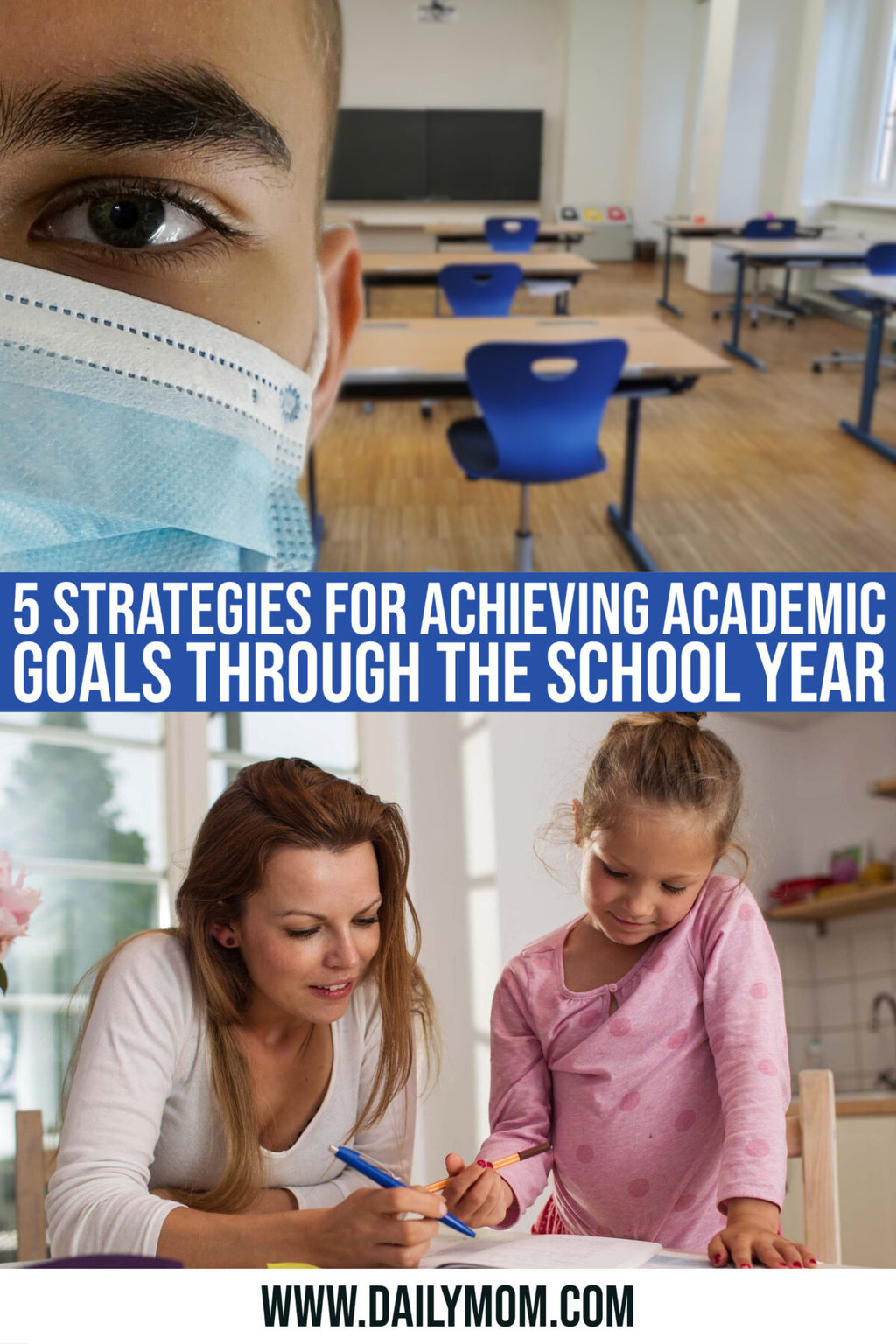It’s here! School’s back in session. Are you ready? Let’s face it, the past year and a half have been extra tough for kids, teachers, and parents. For many, last school year was riddled with a lack of routine and much angst. And there may be another tough year ahead. However, you are now better prepared to get through the peaks and valleys and help your child with his academic goals. Parents and teachers alike have learned some crucial information; therefore, this school year should not be as tough to navigate.
But, parents still need to be prepared for the unknown, because this coming school year is still hovering in that “unknown” territory. It’s imperative to use what you’ve learned through the pandemic to make this coming school year successful with much less stress all around. How? Have no fear, these strategies will help you approach this year with more certainty, which can be key to your child’s success in achieving his academic goals.
Strategy Number 1: Use What You Learned!

What did you learn about your child during the pandemic? And how can you use that knowledge this upcoming year, and in the future, to help your child succeed and meet his academic goals? Having had the chance to watch how your child reacts to a learning environment is actually pretty special. Hopefully, you have gotten to see what his teachers see, and hopefully, you have gotten to know how to offer much more support at home when needed. Honestly, it is a big advantage and can help you plan for this year’s academic goals. Here are some examples to consider:
Routines
First, you have learned how to help your child set routines. Whether your child was in school or not, you probably established some sort of system to get through school days so that your child could flourish as much as possible. Use the knowledge you’ve gained about your child’s routine and set up your routines for this school year before it even begins.
Read More: Sweet & Simple Bedtime Routines
Create a chart or a list for your child to help him know what is expected of him and when. Start practicing going to bed earlier and waking up earlier to establish a good sleep cycle. Write it all down and post it where you and your child can see it each day.
If you found out that your child acted really antsy right after lunch, be prepared for that in case he will be learning at home. If he is going to the actual building, let your child’s teacher know this to help the teacher lookout for those characteristics while your child is in his or her care.
Learning Styles and Academic Goals
Another thing you probably have learned is how your child learns. How does he reach his academic goals? Whether you realize it or not, in terms of your child’s approach to his schoolwork, all of the accomplishments, as well as the complaints, help you to understand his learning style. For instance, is he more of an auditory learner? Is he more visual or logical? Is he a social learner or more independent? I know, if you aren’t a teacher you may not understand these terms for learning styles, but you certainly discovered some of your child’s learning styles while working with him at home.
Perhaps your child absolutely despises writing a paragraph, and each time his teacher assigned that activity you had to fight tooth and nail to get him to write that paragraph. How did you get him to complete the activity and achieve that academic goal? Did you find anything that worked particularly well for him?
If he did not like hand-writing a paragraph, did you have him type it out on the computer? If he found it difficult to come up with something to write about, did you have him talk it out with you? Did you take notes while he explained his ideas and then he was able to transfer those notes onto paper? Did graphic organizers work well?
Maybe you realized that your child needed a break after sitting in front of the computer for an hour. Perhaps it was easier for him to read a physical book instead of one that is online. Maybe he absolutely loved science but did not like art.
Read More: Pro Tip: Parent Like a Teacher
Whatever worked (or didn’t) should be communicated to his teacher. Your child’s teacher will love hearing from you! It takes a little time for a teacher to discern each student’s learning style, and whatever can help the teacher will absolutely help your child, thus helping him reach his academic goals more quickly and efficiently.
Responsibility
Next, you have learned how responsible your child is (or isn’t). Now you’re prepared to set reminders for him. Help him learn to set reminders for himself. If you have an elementary-aged child, he is going to need multiple ways to remember his responsibilities. Perhaps you can make signs and post them around your house so that he can see them and remember to do his homework before he plays his video games.
Or maybe your child showed great responsibility last school year and you continue to positively reinforce that skill with him as much as possible. Show him how being responsible will help him gain much more in his life.
If your child is older, perhaps you can show him how to set a reminder on his phone so he does not forget to finish his homework. Signs work for older children, too, but your child may not be as attuned to them as he is to his phone. And learning how to use his phone for good is beneficial. Learning how to use the calendar and alarm and how to set reminders for himself will help him so much in the long run.
On the other hand, maybe your older child showed immense responsibility last year. If this is the case, talk to him about how wonderful it is to take responsibility and how it helps him and will help him achieve great things in life. Maybe have a conversation or two about how he can continue to be responsible in the future and challenge him by asking a bit more of him. Help him grow.
This is not just helping to achieve his academic goals. This is helping him achieve a life skills goal! His future boss will thank you.
Mental Health/Anxiety
This is a big one. Many kids fall through the cracks when it comes to mental health. But if caught early enough, there is a lot of help out there for him (and for you). Watching him navigate through the pandemic has given you insight into how he deals with his emotions. And honestly, being able to positively and responsibly deal with the stressors of school and life, in general, will help your child reach his academic goals.
Read More: Why Behavioral Health in Children is Important
Perhaps you noticed that your child gets really anxious when there is a test or quiz. This is helpful for you because you and his teacher can help him overcome this. Or you can seek help if it becomes a bigger problem.
Maybe you noticed that your child throws his pencil when he gets something wrong. You can try to figure out where that anger stems from and help him through it. Or, you can seek help if it becomes a bigger problem.
Maybe you noticed that your once talkative and active child has become quiet and inactive. You can pay close attention to this behavior and let his teacher and school counselor know. This way, you can see if it is situational or if something more is going on, and you can find the help he needs to get through whatever is bothering him.
Having had the ability to watch how your child reacts to school, to changes, to new rules–this is all incredibly helpful for you and your child’s teacher. You now have extra insight into your child’s emotions and can steer him in the direction that is best for him.
Strategy Number 2: Connect with School, Especially Teachers

One thing that has always been important, but is even more important now, is communicating with your child’s teacher(s), counselors, and administration. Your first line of communication should almost always be your child’s teacher. After a year and a half of turbulence, both your child and his teacher will be working with a new normal. Keeping the lines of communication open sets up you and your child for a successful school year.
Read More: Going Back to School: 16 Meal Prep & Home Organization Items to Get Families Out the Door
The best way to connect with your child’s teacher is to send him or her a friendly email. Introduce yourself and your child and open up that communication right away. Let the teacher know how it is that you like to communicate. Perhaps you don’t favor email. Send in a note to let the teacher know and ask them to give you a call for a brief chat. Whichever way you’d like to chat with your child’s teacher doesn’t really matter. What matters is that you connect with them and be there to support both your child and the teacher.
Speaking of supporting your child and the teacher: Please understand that educators were thrown for a loop as much as you were, if not more. They have had to adapt lessons and change their way of teaching on the turn of a dime. Your child’s life was surely disrupted, so it would be very beneficial to have a mutual understanding with your child’s teacher that much of the past year and a half has been as unpredictable as the weather. And if this year is turbulent, working together will make it easier.
Lastly, checking sources of information often in this ever-changing environment is extremely important. Whether through your school’s website or app, keep up with what’s going on in the school.
Strategy Number 3: Social-Emotional Needs and Academics Go Hand-in-Hand

Social-Emotional Learning (SEL) is not a new concept. However, it is surely even more important this year. Social-Emotional Learning aims at equipping children and adults with opportunities to learn about how to be empathetic, how to respect others (especially those different from them), and how to become more self-aware. It teaches children and adults to better understand their own emotions as well as other’s emotions.
What does this have to do with education? Well, A LOT! Most children’s first exposure to people who are different than they are is at school. From preschool through twelfth grade, children are surrounded by varying opinions from others, assorted cultures and backgrounds, and others with diverse abilities. They have to learn how to empathetically and respectfully handle these situations and be respectful to the people they meet.
Read More: 5 Reasons You Should Be Playing Pretend with Your Kids
With SEL weaved into academics, children learn to be more compassionate and considerate. Schools aim to get children ready to be responsible, valued, decent adult citizens of our country. It’s a huge responsibility that teachers and staff feel passionate about. Therefore, coupled with a child’s home life, much of what they learn about how to be a kind human comes from school. It completely connects with your child’s academic goals because you want your child to work to his ability both in and out of school.
In his Edutopia article, Why Social and Emotional Learning Is Essential for Students, Roger Weissberg points out that using SEL helps a child learn and use behaviors such as kindness and empathy. SEL also is reported to increase a child’s academic achievement by 11 percentile points! How’s that for meeting academic goals?
How can you help? There is a wonderful toolkit for parents to use at Move This World. You can communicate with your child’s teacher and learn from him or her how your child is doing with SEL and how you can help.
Additionally, you can connect with other parents, as well as become active within your community. Teach your child how to build relationships. Teach them how to rebuild them, too! After this past year and a half, some children lost touch with their friends and now they may need support as they regain their own relationships with others. The same might even be true for you.
Strategy Number 4: Connecting with Other Parents

It does take a village! This past year, many people were forced to lean on others for help with their children and schooling. There were learning pods. Parents began homeschooling their children (FYI: homeschooling is completely different from virtual learning as homeschooling requires the parent to create the lesson plans and activities). This year, leaning on each other will be extraordinarily helpful. Continue to do so. Reaching those academic goals takes the time and effort of a lot of people.
Have a plan in place if it just so happens that your child must stay at home to learn again. Who will watch him? Secure that someone before school even starts. Maybe you can connect with other parents and create a schedule where you take turns facilitating the learning at home. This may be especially helpful if you can’t take off more time from work.
Read More: Community Engagement During the COVID-19 Pandemic
Speaking of work, make sure to have a conversation with your boss. Let him or her know that this school year may be a bit touch-and-go in regards to your child’s education and ask if it is OK with him or her to have a plan in place should you need to stay home for the day. Remember that sometimes there was little notice of school shutting down. Learn from that and be prepared, just in case.
Additionally, maybe you can connect with people in your neighborhood if you haven’t done so already. Become active in your community. Listen and learn from others, and perhaps you will find someone who is in your shoes, too, and you can help each other. The more people you have in your circle, the better.
Your children will see you making plans should schooling become rough again. Through this, they can learn how to lean on their friends a bit more and you can help them prepare as well. Perhaps one friend is really good at math and your child isn’t. Now that we’ve used “Zoom” and “Google Meet” and other types of communication with each other, your child should know how to connect with friends for help. Have him secure a buddy for help if he needs it. Maybe he can help that friend with a different subject? Keep the relationships going. This will certainly support him in reaching his academic goals!
Lastly, you should absolutely keep all negativity to yourself. Instead, even if it is just in front of your child, you should act positively so that your child’s confidence doesn’t suffer. Remaining positive will certainly help you and letting your child know that you have plans in place will help him feel more comfortable going into this school year. Make it a point to tell him that now that you have gone through the turbulence once, you know how to better approach it this time.
Strategy Number 5: Learning Loss/Learning Levels

There are debates about whether or not learning loss has been a problem because of last year’s twists and turns. No matter what you believe, remember that each school year teachers face children who lost a lot of what they have learned from the last school year! Summer break has perpetually been a time where most kids aren’t as concerned with remembering their multiplication facts or how to write a paragraph. Therefore, teachers are used to being prepared to help your child regain anything he may have lost last year as well as helping him meet his academic goals for this year. They are more prepared for this than you think.
Teachers have already anticipated reviewing the things your child learned last year. Also, school districts have already anticipated how to find out each child’s learning level right away this school year. They have had time to prepare, and so have you. If you do not see that happening, speak up. Talk to your child’s teacher. Let him or her know if you feel your child is behind in a subject or two. Communication is key.
Read More: Raising Resilient Children: Why It’s Important and 3 Key Tips
Moreover, something people tend to forget is that children are quite resilient. They pick right back up very quickly. They soon will be right where they need to be, so worry not. Be prepared to communicate with your child’s teacher and help your child with homework and studying. You will be surprised at how quickly your child will bounce back.
And if school closes down and then opens up again and then closes down again and then opens up, be prepared to ask the teacher for help when you feel like your child needs it. Open communication between parent and teacher is crucial in keeping a child on track.

Read More: BECOMING INVOLVED IN YOUR CHILD’S LEARNING
In the end, there are several things you can do to make sure that this school year runs smoothly. You CAN help your child reach his academic goals. Use what you have learned and implement these strategies to assist your child. The more you do at home, the faster the child will excel at school. Homework will be even more important now as well. Therefore, keep going. Keep preparing ahead of time. Keep focusing on what you’ve learned and what you would like to see happen this year. Keep the lines of communication open and keep recognizing that everyone is in this together. Doing so will benefit you and your child more than you know.
CONNECT WITH DAILY MOM
💖 NEWSLETTER: DAILY READS IN YOUR INBOX 💖
Sign up to receive our picks for the best things to do, see and buy so you can relax and focus on more important tasks! Let us help you be the best version of yourself you can be!
BE SOCIAL WITH US
📌 LOVE IT? PIN IT!📌












































